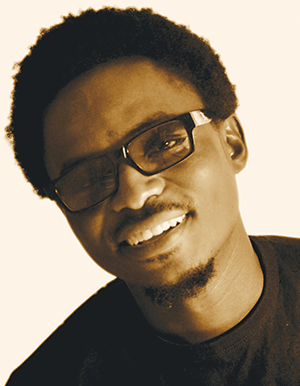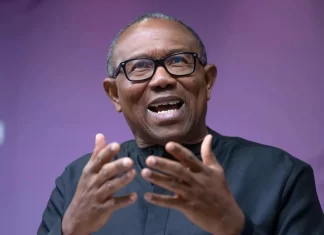Eric Aghimien is the director of the award winning A Mile from Home, his first feature film that has taken the Nigerian movie industry by storm. The filmmaker, who studied science laboratory technology at Auchi Polytechnic, Edo State, in this interview with Assistant Life Editor, TERH AGBEDEH, talks about his future in film.
A Mile from Home has no doubt been a very successful movie, considering the awards it has so far won. Did you see this success coming when you made the film?
I would say ‘not really’ because I made A Mile from Home with a very little expectation, but at the same time paying attention to details. Nobody ever thought the movie would be this great, considering the budget at my disposal. There was a time on set when we ran out of money and some members of our team stopped believing in the project, making the production more difficult. At this time, I had to depend on my instinct, my passion and God. And God’s grace saw it through.
Would you describe yourself as one of the fastest rising directors in the country?
Well, this is my first feature and it’s been well received with positive reviews and ratings on TVs and blogs, one of which was Top 5 Directors in Nigeria and I have received a lot of awards. So, yes, I would describe myself as one of the fastest growing filmmakers in the country and the most privileged too.
You came off the Berlinale Talents 2015 earlier in the year; what did you take away from the experience?
Berlinale Talents was such an awesome experience I will never forget. I learnt a lot, but to mention a few, as a director I would say I learnt how to help actors and get the best out of them, how to create worlds that do not exist from space and how to engage the audience. Also, I met prospective collaborators for future projects and I think this is great for Nollywood too.
Would you encourage other Nigerian filmmakers to attend?
Absolutely, I would encourage other Nigerian filmmakers to apply and be a part of this great experience. It’s an experience no film professional should miss, although very competitive, 300 participants selected from over 2,500 applications. For this year’s, 300 people were selected from 70 countries all over the world.
Did you always want to do films, and would you say that you are well on your way to reaching the goal you set out to achieve?
No, at a time I wanted to become a medical doctor because of where I grew up. People made me believe that you have to be a doctor or lawyer to be successful; but my late uncle, Imuetinyan Osaghae, helped me discover the right path to take and I have never regretted it. Now, I can truly say that I am on the right path to achieving my dreams.
What film project are you working on right now and who is involved?
I have a couple of stories I would love to tell but I have not decided yet the one I will bring forward as my next project. So I wouldn’t know who is involved for now.
How different is it from A Mile from Home?
I really do not like the fact that some journalists describe me as an action film director because, as a filmmaker, I’m a storyteller. I can tell any kind of story; it doesn’t have to be action. But I have carved a niche for myself in action, and I may put a little action in my stories for my fans where and when necessary. What I am working on now is very different from A Mile from Home and I’ll rather not say anything about it, since I’ll like to make it a surprise.
What do you like best about directing?
The fact that it gives me the absolute freedom to tell my story the way I want to tell it and make my characters who I want them to be for the good of the story.
How did you decide that directing was where you wanted to pitch your tent?
I did not choose to be a director; directing chose me. It is inbuilt; it defines me. I constantly have visions of stories in my head and my ability to bring them to your screen makes me a director. For me, it just plays out naturally.
Does it worry you that no Nigerian film has been nominated at the Oscars, although we are such a famous moviemaking country?
It actually worries me a lot because our filmmaking culture here does not permit good movies. Everybody just wants to make money, instead of paying attention to details. Don’t get me wrong; money is good, but I believe paying attention to technical details in moviemaking could yield more money in the long run. Not forgetting that we have no or limited access to fund; we need to invest more time and research in our stories and technicality. Let’s even bring it home to Africa; in the past years, our performance in AMVCA (AfricaMagic Viewer’s Choice Awards) and AMAA (Africa Movie Academy Awards) has dropped, it’s either a movie from Kenya or South Africa is taking most of the awards or one from.
How did winning at the AMAA and Nollywood Movies Awards (NMA) make you feel?
I felt really fulfilled, meaning there where things I did right in the movie. I am encouraged to do better next time.
What would you do differently when shooting your next film?
I made A Mile from Home from the knowledge acquired online, from books and from my natural instincts as well. But now, I have undergone some training in some workshops in Nigeria and abroad, so it will definitely show in my next movie, technically.
Would you describe yourself as a very religious person?
When people talk about religion these days, I can hardly understand what they mean. I am a Christian by the grace of God, sold out completely to Jesus, and can’t say I am perfect, but His grace is sufficient for me.
What would you point to in your childhood that prepared you for life as an adult?
Ah! That’s a tough question to answer. My childhood was not very pleasant because my parents broke up and I suffered emotionally, hoping they would one day come back together. But it never happened and I am still hoping. I remember, then as a child, I used to cry each time I visited any of my friends who still have their parents together. I was two years old when my parents broke up and I never saw them together. Now, I have told myself, I will not let my children go through that same experience of emotional torture. I want to be a better man and build a better family and a conducive home for my children to grow up.
What would you tell young people who would like to be directors?
Young people who want to become directors must learn to listen and be tolerant because they will work with so many unpleasant and pleasant people. They must open themselves to training and criticism (constructive and destructive) because they will get those a lot in their life time. Finally, if they don’t want to be criticised, they should go and farm or fish or bake or become full-time house wives or husbands or do something else. I am serious.
Would you consider directing a stage play?
Not sure, but it is something I would like to try someday.
Does directing actually pay your bills?
Not yet, but it will. I am a very selective director; I do not take every job I am offered. Several people, including some top industry players, have approached me with projects that I turned down respectfully because I could not connect with their stories and their style of work. If you are motivated by money in this job, I assure you, you will be frustrated, except you are just a junk-making director who takes any kind of project he is offered.
When you look into your future in filmmaking, what do you see?
When I look into my future, I see lights, so many lights; some flashing, people screaming on top of their voices for joy and calling my name and then I see myself holding Oscar, Golden Globe, BAFTA etc…Wake up boy! That simply means “more work”.















